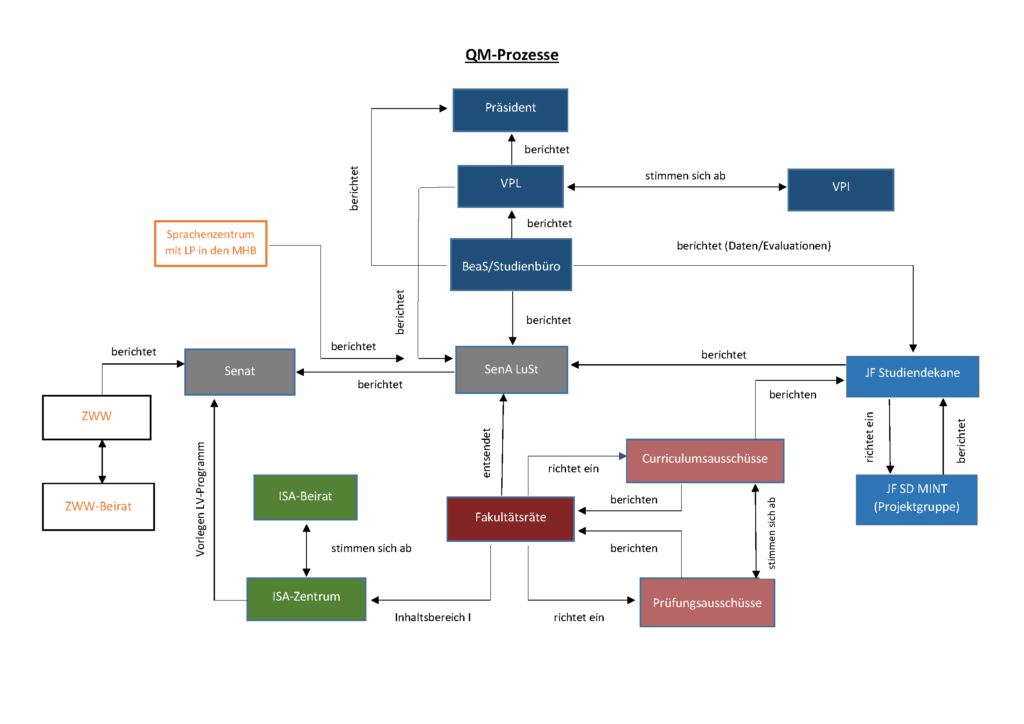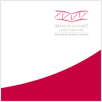HSU/UniBw H is characterised by very close interaction between the individual parties involved in the process at all levels. The deans of studies are also members of the examination boards or curriculum committees of the faculties and are also largely represented in the Senate Committee for Teaching and Studies (SenA LuSt). This and other personnel and institutional overlaps enable efficient coordination and management of processes in the area of teaching and studies.
Centralised process participants (university level)
1. vice president for teaching and studies
2. representative for studies
3. jour fixe of the deans of studies
4. senate committee for teaching and studies
5. ISA Advisory Board (Interdisciplinary Study Programmes)
Process participants Decentralised (faculty level)
1. deans of studies
2. examination boards
3. curriculum committees
4. representatives for ISA studies
Detailed description of those involved in the process Centralised (university level)
1. The Vice-President for Teaching and Learning (VPL) chairs various permanent university committees, such as the Senate Committee for Teaching and Learning (SenA LuSt) and the ISA Advisory Board. In addition, he/she is responsible for leading internal or cross-university project groups in the Teaching and Studies department.
2. The President’s Representative for Studies and his/her team is the central contact person for all questions relating to the organisation and further development of studies and works closely with the VPL. She or he is responsible for the organisation of accreditation procedures, teaching didactic training, the survey of teaching loads, the evaluation of teaching and study programmes and all other surveys related to teaching and studies (e.g. graduate surveys, evaluation of individual central facilities). The updating, analysing and forwarding of controlling data from the area of studies to the committees involved in quality development is also carried out here.
3. The deans of studies meet monthly at the working level with the VPL, the representative for studies and the head of the legal department at the jour fixe of the deans of studies. This is where overarching quality development projects are coordinated in detail. To this end, other stakeholders are regularly invited to the Jour Fixe of the Deans of Studies over longer periods of time in order to deal with specific issues.
4. The Senate Committee for Teaching and Studies (SenA LuSt) is a permanent committee of the Academic Senate that deals with teaching and study issues at university level. It meets at least once a term and deals primarily with conceptual issues relating to the further development and improvement of teaching and study organisation. Quality assurance in teaching is primarily the responsibility of the faculties; however, the SenA LuSt is responsible for bringing together and coordinating activities at a higher level. The university groups are represented in it. The Head of Student Affairs, the Student Affairs Officer and the Civilian and Military Equal Opportunities Officers attend the meetings in an advisory capacity. Depending on the issue at hand, guests are invited to attend in an advisory capacity.
The SenA LuSt works closely with the Senate Committee for International Affairs, chaired by the Vice President for International Affairs, and the International Office [Link] on issues relating to studying abroad. The latter is responsible for quality management in the area of study abroad (both incoming and outgoing students).
5. The ISA Advisory Board is made up of the VPL, the ISA representatives of the faculties, two academic staff members and two students. The Managing Director of the ISA Centre [Link], the Head of Student Affairs and the Civilian and Military Equal Opportunities Officer participate in an advisory capacity. The composition of the ISA Advisory Board ensures efficient interdisciplinary coordination using specialist expertise. The ISA Advisory Board assumes the tasks of a faculty council with regard to the centrally located ISA and decides in particular on the proposal for the ISA teaching programme. In addition, the ISA Advisory Board discusses proposals for improving the ISA concept, approves the ISA annual report and advises and supports the Managing Director of the ISA Centre.
More detailed description of those involved in the process Decentralised (faculty level)
- The deans of studies are the central link for their degree programmes, in particular between lecturers, students, the Examinations Office, the Examination Board and the group leaders as the students’ direct superiors. The deans of studies speak for their degree programmes in the accreditation procedures and play a decisive role in the quality and further development of their degree programmes.
- Each faculty and the Departmental Committee for Industrial Engineering and Management (SBA WI) has at least one examination board. The examination boards make recommendations for the further development of the degree programme based on their findings in examination matters. To this end, the chairpersons of the examination boards regularly consult with the deans of studies or report to the respective faculty councils and the SBA WI. The examination boards also deal with individual problem situations of students and support the further development of examination regulations.
- The curriculum committees of the faculties take on central tasks in the areas of planning, coordination and quality assurance of the individual degree programmes. A curriculum committee is typically made up of representatives from the various disciplines and status groups of the faculty and the decentralised faculty administration (although the composition and organisational form may vary slightly in individual faculties). The tasks of a curriculum committee include, in particular, the planning and comprehensive organisational support of the introduction of new degree programmes as well as the further development of existing degree programmes, e.g. on the basis of improvement requests from students or teaching staff.
- Each faculty appoints a professorial representative for ISA studies who, as a member of the ISA Advisory Board (qua office), acts as a link between the ISA Advisory Board and the faculties. The representatives for ISA studies play a key role in that the ISA curriculum is developed and evaluated in the faculties and decided on in the respective faculty council, but the decision on the ISA curriculum as a whole is made in the ISA advisory board.


Letzte Änderung: 16. April 2024